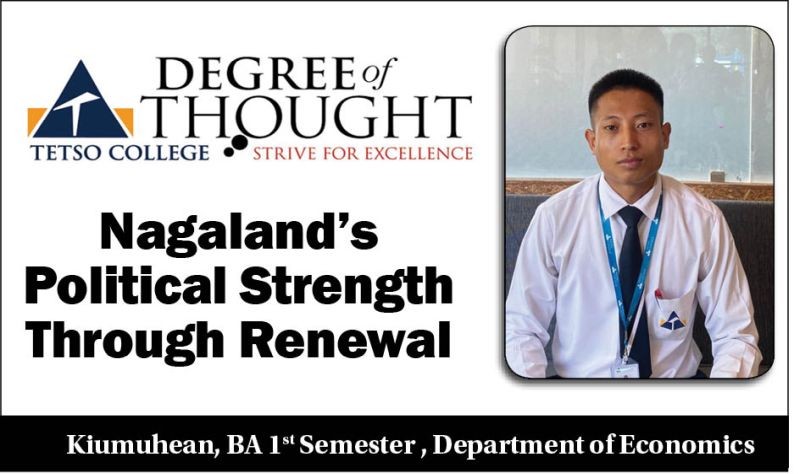
Nagaland stands at a turning point. For decades, our politics has carried the weight of unresolved conflict, uneven development, and the struggle to balance tradition with modern governance. But today, across all districts from Noklak to Zunheboto, from Longleng to Wokha, there is a quiet but growing call for something deeper than peace: a politics rooted in purpose, participation, and pride.
Recent legislative reforms offer a glimpse of what’s possible. In March 2025, the Nagaland Assembly passed six key bills aimed at improving governance and accountability. The Disqualification on Ground of Defection in Urban Local Bodies Bill seeks to stabilise local democracy. At the same time, amendments to the Nagaland Municipal Act and the Road Safety Authority Bill reflect a renewed commitment to urban planning and citizen safety not just in Dimapur or Kohima, but in every town and ward across the state.
Yet laws alone don’t build trust. Political strength must be felt in the everyday lives of people in the village councils of Kiphire, the youth forums of Peren, the women’s collectives of Tuensang, and the farmers’ unions of Mokokchung.
The demand for a Frontier Nagaland Territory, led by the Eastern Nagaland People’s Organisation (ENPO), reminds us that regional equity cannot be postponed. For too long, Eastern districts have faced neglect, poor infrastructure, limited access to services, and minimal representation. The proposed territory isn’t just about boundaries; it’s about dignity. It’s about ensuring that every region, from the foothills to the highlands, has the power to shape its own future.
Meanwhile, the establishment of new committees on climate change, urban governance, and tribal affairs signals a shift toward more responsive policymaking. These panels must not remain confined to capital corridors; they must reach the grassroots, where real change begins.
To truly strengthen Nagaland’s politics, we must embrace three shifts:
1. Inclusive Participation
Village councils, tribal bodies, and civil society groups must be empowered, not just consulted. Youth and women must be brought into decision-making as leaders, not tokens. From Mon to Phek, from Shamator to Chümoukedima, every voice must count.
2. Transparent Institutions
Credibility comes from clean governance. Strengthening anti-corruption bodies, ensuring fair recruitment, and digitising public services can rebuild trust. When citizens see fairness in action, they invest in the system.
3. Civic Education and Dialogue
Politics must be demystified. Schools, colleges, and media should foster civic literacy teaching not just rights, but responsibilities. Open forums between elected leaders and citizens can bridge the gap between policy and public need.
Nagaland’s politics must reflect its people: resilient, diverse, and deeply rooted in community. It must move beyond factionalism and favouritism, toward a politics of service. A politics that doesn’t wait for Delhi to decide, but listens to Noklak, Kohima, Peren, and Wokha with equal urgency.
The strength of our politics will not be measured by the number of bills passed or the size of our budget. It will be measured by how well we protect the vulnerable, include the excluded, and honour the wisdom of our land.
Nagaland doesn’t need to be saved. It needs to be trusted. And that trust begins with a politics that is ours, not borrowed, not imposed, but built from within.
For this vision to take root, leadership must rise above election cycles. Too often, politics in Nagaland has been reduced to the arithmetic of votes and alliances. What we need now are leaders who think generationally—leaders who invest in schools and universities, in health infrastructure, in arts and culture, knowing that these are not quick wins but the true foundations of a thriving society. Political will must be measured by the courage to prioritise long-term good over short-term gain.
Equally, the role of technology and innovation cannot be overlooked. With reliable internet connectivity still uneven across districts, bridging the digital divide should become a central political goal. E-governance platforms, digital marketplaces for farmers, and skill development in emerging sectors like renewable energy and information technology can open doors for Nagaland’s youth. In a globalising world, local empowerment requires digital inclusion.
At the same time, Nagaland’s politics must remain attentive to culture and identity. Our festivals, oral traditions, and community practices are not relics of the past but living forces that shape how we govern and how we relate to one another. When policymaking respects cultural institutions—whether through recognition of customary laws, protection of indigenous knowledge, or promotion of local art and literature—it grounds governance in values that people already trust.
Equity also means looking beyond district lines to the borderlands where Nagaland connects with Assam, Manipur, Arunachal Pradesh, and Myanmar. Here, the politics of cooperation is vital—whether in trade, security, or cultural exchange. Building corridors of collaboration rather than conflict can strengthen not only our economy but also our sense of belonging within a wider region. Nagaland’s political maturity will be tested by how well it balances its distinct identity with its responsibility to the neighbourhood.
Finally, healing the fractures of the past is essential to moving forward. Dialogue between different tribes, between church and state, between civil society and government must be sustained and sincere. Political reconciliation is not just about peace talks with insurgent groups—it is about weaving together trust among all communities, urban and rural, young and old. Only then can Nagaland truly claim a politics that reflects its shared dreams and collective strength.
Degree of Thought is a weekly community column initiated by Tetso College in partnership with The Morung Express. Degree of Thought will delve into the social, cultural, political and educational issues around us. The views expressed here do not reflect the opinion of the institution. Tetso College is a NAAC Accredited UGC recognised Commerce and Arts College. The editorial team includes Chubamenla, Asst. Professor Dept. of English and Rinsit Sareo, Asst. Manager, IT, Media & Communications. For feedback or comments please email: dot@tetsocollege.org






